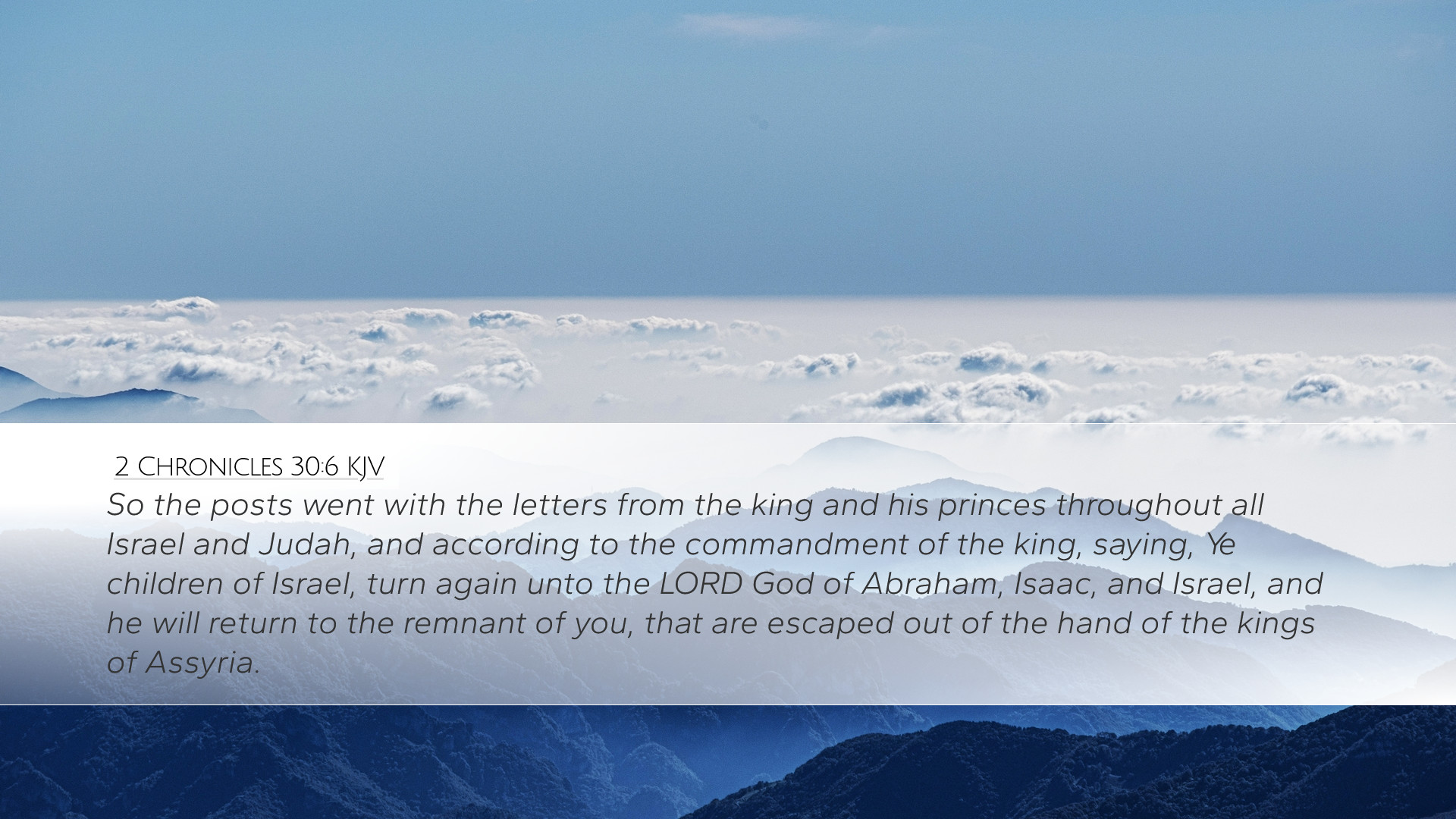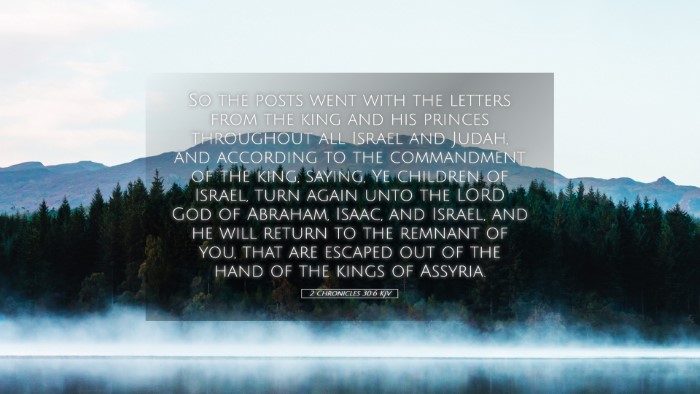Commentary on 2 Chronicles 30:6
Verse: "So the runners went with the letters from the king and his princes throughout all Israel and Judah, and according to the commandment of the king, saying, 'O children of Israel, turn again unto the Lord God of Abraham, Isaac, and Israel, and he will return to the remnant of you, that are escaped out of the hand of the kings of Assyria.'" (2 Chronicles 30:6, KJV)
Introduction
This verse encapsulates a pivotal moment in the history of Israel, where the southern kingdom of Judah, under King Hezekiah's leadership, takes the initiative to invite the northern tribes of Israel back to the worship of the true God. Here, we will draw insights from various public domain commentaries to explore its theological significance, historical context, and practical implications.
Historical Context
Hezekiah's reign is marked by a revival of faith in Yahweh, restoring Judah's religious practices which had deteriorated under previous kings. The division between Israel and Judah had deepened due to idolatry and disobedience. In seeking reconciliation and spiritual restoration, Hezekiah sent messengers, as we see in our text, with letters calling the people to return to the Lord.
The Call to Repentance
The messengers' proclamation, “O children of Israel, turn again unto the Lord,” suggests both a recognition of sin and an invitation to repentance. Matthew Henry points out that repentance is an essential precursor to receiving divine mercy. The appeal to “turn again” signifies that the Lord is not only gracious but also ready to receive those who return with genuine hearts.
The Nature of the Appeal
Albert Barnes emphasizes that the appeal was directed not only to the people but also specifically mentions the “remnant.” This concept of a remnant is vital throughout Scripture, portraying God’s faithfulness to His covenant even amidst widespread apostasy.
God’s Faithfulness
The verse outlines a promise: if they return, God will likewise return to them. Adam Clarke elaborates that this divine reciprocity expresses God’s unchanging character and readiness to forgive sinners who genuinely seek Him. This principle of divine loyalty is foundational in understanding the nature of God in the Old Testament.
Theological Implications
In the broader theological understanding, this passage reflects the concept of redemption and the covenant relationship that God maintains with His people. The invitation to return is both a personal and communal call, illustrating the collective responsibility of nations to acknowledge their Creator.
Covenantal Aspects
Matthew Henry observes that this call to return emphasizes the familial nature of God’s relationship with Israel. Referring to “the Lord God of Abraham, Isaac, and Israel,” invokes the patriarchs, reminding the people of their heritage and the faithfulness of God across generations.
Mission of Restoration
The act of sending runners with letters represents a proactive approach to ministry and outreach. Albert Barnes notes that this movement reflects a desire for unity and reconciliation, illustrating the church’s mission to reach out and restore those who have wandered from the faith.
The Practical Application
For pastors and theologians, this passage offers a directive to foster outreach and evangelism within their communities. The call for individuals to turn back to the Lord remains relevant today. Adam Clarke asserts that believers must imitate Hezekiah's example in their ministry efforts, particularly in an age where many have strayed from biblical principles.
- Encouragement for Repentance: Regularly call congregations to evaluate their relationship with God, emphasizing repentance as a pathway to restoration.
- Invitation to Unity: Emphasize unity within the body of Christ, mirroring the text's call for the Northern tribes to return.
- Focus on God’s Character: Consistently teach about God’s readiness to forgive and His covenant faithfulness.
Conclusion
2 Chronicles 30:6 poignantly illustrates the heart of God toward His people and showcases a leader’s zeal to bring reconciliation and restoration. The theological implications stretch far beyond the ancient context, resonating with contemporary believers. As we reflect upon this passage, let us as pastors, students, and scholars rekindle the calls to repentance and embrace God’s unyielding grace, fostering a spirit of renewal within our communities.


